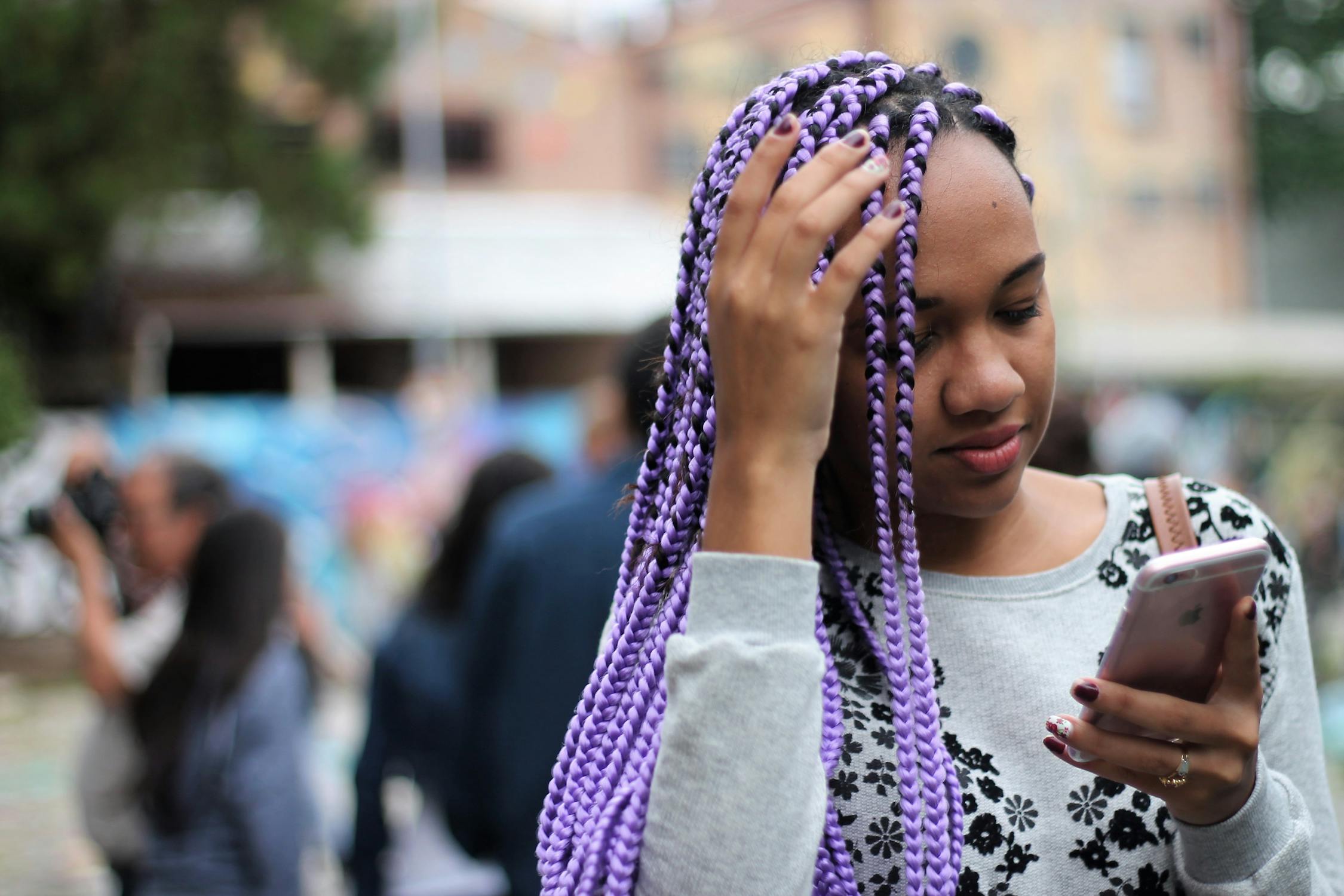Posted on May 13 2021
OVER THE LAST FOUR YEARS, WE'VE BEEN BATTERED BY UPSETTING ARTICLES, VIDEOS AND PHOTOS OF WIDESPREAD INJUSTICES. 2020 ONLY HEIGHTENED THE SENSE THAT THE WORLD WAS GOING TO SHIT, WITH MANY OF US BEING TRAPPED INSIDE, HAVING NOT MUCH TO DO BUT DOOM-SCROLL AND FEEL HELPLESS.
By Jax Cassidy
There’s a question that started nagging at me when the Black Lives Matter protests were reaching their height last summer. That time was when I first realized that I need to seriously course-correct the way I show support for marginalized peoples on social media, because it was made apparent to me that continually reposting enraging headlines to the echo chamber of my Instagram story was not helping anything. In fact, it was probably doing more harm than good.
Of course, I wasn’t only reposting the headlines, but the resources that I was also sharing were probably getting lost in the mix, and I could easily tell the people who follow me- many of whom follow a lot of the same activism accounts I do- were getting burnt out on what I had to share. Which brings me to the question at hand: Are the people you advocate for still at the center of your activism?
While I was working on the first draft of this article, I came across a graphic on Instagram that perfectly sums up the message I want to get across here. In a post from the account for Melanin & Mental Health, there was a clear statement made that I whole-heartedly agree with: “You do not need to be retraumatized to stay informed”. With the horrific headlines that 2021 has brought us so far, I can only hope that these words stick with those who need to hear them.
Over the course of the last four years, we’ve been battered by upsetting articles, videos and photos of widespread injustices. 2020 only heightened the sense that the world was going to shit, with many of us being trapped inside, having not much to do but doom-scroll and feel helpless. Whether your response has been to doggedly keep up with the news and continually recirculate information, or to take time to yourself to avoid losing hope altogether, that’s valid. I currently lie somewhere in the middle.
But to be clear, there’s a fine line between needing to take that time to protect your peace- or recover from a trauma response- and taking that time to protect your privilege. The internet can be a toxic place, and the news lately is a constant inundation of suffering, to a level that the human mind isn’t actually prepared to comprehend. We’re not meant to consume so much disturbing content on a daily basis. That’s why so many people have become conditioned to it, to the point that they feel numb. That’s why it’s easier for more privileged people to feel a right to “take a break” from it, to turn away from the issues and fall back into their comfort zone. We have to fight this. For the people who are oppressed by the systemic failings of our nation on a daily basis, there is no break. For allies, it’s important to challenge our comfort. There’s a difference between taking the time to care for yourself, to overcome that numbness, and taking refuge in complacency when things are hard to face.
It is important to take breaks from social media in general. It’s something I recommend to everyone in order to preserve their peace. It’s something I do regularly. I often have to remind myself that my social media platforms aren’t news sources, nor do I want them to be. But I do want them to be uplifting spaces for anyone that’s a part of them. So I’ve striven to find a balance between focusing on heavier topics and keeping things light-hearted and personal. Spoiler alert: it’s harder than I thought it would be. Especially when struggling with your mental health behind the scenes.
There’s a quote from Vincent Van Gogh that I always remember at times when I feel like I’m not doing enough or just feel inadequate: “What is done in love is well done.” It’s important, in every aspect of life, to check with yourself and make sure that love is genuine and unselfish, particularly when the time comes to show up for others. I believe that the only way to make sure that’s the case in activism is to take the time to process an event in order to approach sharing/talking about it more mindfully. Posting on topics in a purposeful way is going to be beneficial not only to your mental health, but also to the wellness of your followers. It’s also the best way to avoid burnout, or going down the dreaded route of performative activism.
I’ve had to look inward a number of times to be sure that my allyship is coming from a genuine place. It’s an important thing for every ally to do so, because it’s human nature to think you know yourself and what you’re here for, but actually- maybe- be wrong. I’ve made a habit of checking myself when I’m approaching activist spaces that weren’t made for me. It would never be my intention to speak for or over anyone, but that doesn’t mean it won’t happen. (Intent doesn’t matter; impact does.) So, when I do reshare certain information, I keep my narrative out of it, and instead aim to uplift the voices of others. The simplest thing you can do if you don’t know where to start is listen to & amplify marginalized voices. It was by listening to these voices that I realized I needed to rethink how I participate in these conversations.
I know people who’ve had to set certain boundaries on social media- or take extensive breaks from it- because they couldn’t go online without being overwhelmed by triggering content. These are the people who I think about when I consider how I handle what I’m posting online; the people I know and care about, who are traumatized, and consistently being retraumatized by the circulation of mortifying images, often without warning.
Of course, there are going to be times when sharing potentially triggering content is unavoidable. Some difficult conversations need to happen in order for there to be awareness and change. The issue lies in people online not critically thinking about what it is they’re sharing, and whether it’s actually appropriate to do so. When you get lost in the cycle of resharing the shocking headlines, the disturbing videos/pictures, the upsetting articles, it can be easy to become desensitized to them, especially if they’re related to an issue that doesn’t necessarily affect you. The way to fix this is to ask ourselves before posting: Is this a valuable resource to add to the conversation, or is it just wielding the trauma of an oppressed group? Could this potentially trigger anyone who follows me?
These are questions I’ve been putting into practice when it comes to evaluating whether I’m approaching a subject responsibly online. Not everyone is there to be a part of these conversations; for plenty of people, their online space is meant to be a safe one, a private bubble reserved for things that bring them joy. These people shouldn’t have to be subjected to triggering content that they weren’t expecting, and therefore made to feel unsafe. (Again, there’s a difference between these people and the ones who don’t want to be confronted with their privilege. You can care for yourself and what you’re exposed to online and still challenge your own comfort.) So when it comes to sharing information online, if you’re really unsure of what you should post in relation to an issue, I have some tips for you.
(A note: This isn’t me trying to dictate how you should go about your activism or tone police you in any way. These are just some changes I’ve found helpful that you can keep in mind if you want to.)
First, and most simply, I don’t like to spread videos or photos that depict violence and abuse perpetrated against people living in marginalized bodies. It’s become too normal to see these things in our feeds, and it’s dehumanizing. If your followers have indicated to you at some point that they need this kind of evidence to believe the incident happened or feel any kind of empathy toward a victim, there’s a deeper issue you might need to tackle.
If you’re about to post something containing words or images that could be upsetting, add a trigger warning beforehand. And, be open to conversing with people who take any kind of issue with what you might post. If a person who follows me were triggered by something I shared, I would want to know about it. I wouldn’t expect them to explain why, because that burden is already placed too heavily on oppressed groups. But I remain open to any criticism and take it as an opportunity to learn how to shift my approach in the future. These are easy ways to decenter yourself when taking part in activism online that can be applied to in-person interactions as well.
Speaking of, if your “activism” has consisted exclusively of sharing trauma content, it’s time to reassess. Only sharing news articles your followers will never read (Like this one, am I right?) or reposting triggering imagery with a “Can you believe this sh*t?!” is not going to create progress. Try instead sharing petitions, fundraisers, or information on events and gatherings surrounding the issue, or links to educational resources. If you’re having a hard time finding these, you might want to follow new accounts that will lead you to them.
Finally, remember to share the good stuff too! It can be hard to remember that everything’s not actually terrible, I know. As important as it is to stay informed on the negatives, you have to seek out the positives as well. Highlight happy news from around the world. Share moments of joy and empowerment within marginalized groups. Promote businesses that are BIPOC-owned, queer-owned, women-owned, indie, small, and/or local to your area! Uplift artists of all kinds who live to put their struggle into perspective or by advocating for a cause they care for. Joy is the simplest act of rebellion; try to be a source for it. (You could also just throw in some cute or funny memes to break up the tension. This is usually how I reward the people who make it through my Instagram story.)
I’ve been trying to share and advocate in a way that seems the most respectful and also the least likely to make anyone who sees my posts feel retraumatized…while still putting things as bluntly as I can for people who might otherwise be unaware of a story’s impact. It’s a fine line to walk, and it takes a lot of consideration and practice. I’ll probably never be perfect at it. But to keep marginalized lives at the center of these conversations, we have to remember how the mental health of marginalized peoples can be impacted by their social media feeds today.
Jax is a freelance writer and content creator who strives to deconstruct tired ideals of beauty and create a safe and supportive space for all in her little pocket of the internet. She’s passionate about writing and teaching, as well as being an advocate for mental health awareness (being someone who struggles with depression and anxiety herself) and equality for all. You can find her on Instagram.



0 comments